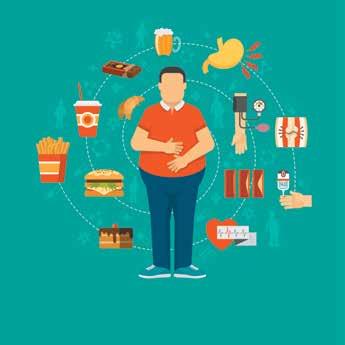
9 minute read
The Junk Food Culture
THE JUNK FOOD
CULTURE
Advertisement
Sapna Budhlakoti
Coordinator Six Sigma Healthcare, Delhi
NNow a days, it’s very common to see obesity, diabetes or some heart related issues in people and specially among children at a very low age and the root cause of all this is their unhealthy food eating habit. Some of the StartliNg detailS are: Only 50% students bring healthy and hygienic food in the school, rest of them go to the cafeteria or some shops nearby where they eat burger, fries, momoes, noodles or chips etc...
So now the question is what is the problem with fast food and how its effecting the child’s health? If a child consumes such unhealthy food items for a long period of time on regular basis it can lead to serious health problem. the caloric content (carbohydrate, fats and high level of sugar) will contribute to rapid obesity of a child, and an onset obesity nowdays as visible in adults I think should not surprise us. You know how much the famous street food momoes and noodles can harm us if we take it on regular basis :
aziNomoto
monosodium glutamate (mSG) also known as azinomoto which enhance the flavour of these food items, US Food and Drug Administrator (FDA) has received many reports of concerning reactions that people have attributed to the foods that have mSG in them which includes-headache,

flushing, numbness, burning in face, chest pain weakness etc.
So what to do for a proper aNd healthy NutritioN?
For fit and healthy life most important thing is good and healthy nutrition. by eating proper and healthy food a child's body gets the proper nutrition and it functions and grows properly. N A healthy food includes vitamins, iron, minerals, proteins. Healthy diet reduces the risk of heart diseases obesity and stroke. N A person for a healthy diet should eat a combination/ variety of food items like cereals, rice, green vegetables, maze, legumes, fruits, eggs and milk. N eat plenty of vegetables and fruits and avoid overcooking of vegetables. N Use moderate amount of fats and oils. Unsaturated fat oils like olive oil, sunflower oil etc. rather than saturated fats like ghee, coconut and palm oil. N eat less salt and sugars: snacks are high in salt and soft drinks or soda are high in sugars.
Now aNother queStioN ariSeS that what Should Be the Sugar limitS?
Sugary foods comprise no more than half of a person’s daily discretionary calorie allowance. Now you will ask what is discretionary calorie. So discretionary calorie are those that are left over once a person has met their daily nutritional needs. this allowance differs for men, women, and children. Men men should consume no more than 150 discretionary calories of sugar per day. this is equivalent to 38 g or 9 teaspoons (tsp) of sugar.
Women Women should use no more than 100 discretionary calories on sugar per day. this is around 25 g or 6 tsp of sugar.
Children children between the ages of 2 and 18 should consume no more than 25 g trusted Source, or 6 tsp, of added sugar daily.
theN what Should the people haviNg diaBeteS Should do?
Diabetes makes it difficult for the body to use glucose effectively. the body converts both naturally occurring and added sugars into glucose, that’s why a diabetic person has to monitor his or her overall intake of sugar level.
Foods with a higher GI (glycemic index) raise blood glucose. more than avoiding added sugars focusing on consuming the right amounts of fiber and nutrient-dense carbohydrates from whole foods can help stabilize blood sugar levelsfoods with a lower GI. the following tips can help a person replace the added sugar in their diet with more healthful alternatives: N try adding mint leaves, cucumber, berries, or citrus fruit to plain or sparkling water. N Swap sweets and desserts for fruit, but avoid canned fruit in syrup. N Prepare homemade sauces and salad dressings.

N replace store-bought granola and snack mixes with homemade varieties that include unsweetened dried fruits and non-frosted wholegrain cereals. N When cooking or baking, use unsweetened apple sauce or mashed bananas instead of sugar. N Stop using sugar in tea and coffee or reduce the amount. N Use herbs and spices instead of sauces that contain added sugar.
Fats: We consume fat in the form of triglycerides. A triglyceride molecule consists of three fatty acids attached to a glycerol backbone. the fatty acids contain chains of carbons and hydrogens.
how much fat iS healthy to eat per day?
the appropriate amount of fat to eat will depend on your calorie requirements for weight loss or maintenance. It’ll also be based on your eating style and diet.
how maNy calorieS Should you eat oN average?
the number of calories you should eat per day depends on numerous factors, including your age, sex, height, current weight, activity level, and metabolic health, among several others.
When trying to lose weight, it’s important to create a calorie deficit by consuming fewer calories than you normally do or by exercising more.
Don’t cut your calorie intake too much as cutting your calorie intake too drastically not only will cause several serious side effects but also increases your risk of nutritional deficiencies.
Here’s a closer look at how many calories you should eat: Keep in mind that the exact number of calories that you need may fall on the high or low end of this range — or even exceed it — depending on how active you are, plus your height, weight, and health status.
Women calorie needs for women can depend on their age, size, and activity level. most women between the ages of 19–30 require 2,000–2,400 calories per day to maintain their weight.
Women between the ages of 31–59 have slightly lower energy needs. Generally, women in this age group should consume 1,800–2,200 calories per day to maintain their body weight.
Women over age 60 generally require fewer calories and typically need to take in around 1,600–2,000 calories per day to maintain their weight.
Men As is the case for women, calorie needs for men may range based on several factors. the most recent Dietary Guidelines for Americans estimates that men between the ages of 19–30 should consume 2,400–3,000 calories per day to maintain their weight. energy needs decrease as you get older. In fact, men between the ages of 31–59 need about 2,200–3,000 calories per day to maintain their weight, while men over 60 generally require 2,000–2,600 calories. men who are very active or have certain health conditions may require more calories. the number you need within these ranges also varies based on your height and weight.
Children children have widely varying calorie needs based on their age, size, and activity level. energy needs for children and teens vary based on their sex and age. A 3-year-old child might need only 1,200 calories, but a teenager can require closer to 3,000 calories
However, keep in mind that there’s typically no need to count calories for growing children and teens.
In fact, cutting a child’s calorie intake may increase their risk of nutritional deficiencies, slow growth, and foster an unhealthy relationship with food or an eating disorder.
Instead of counting calories, it’s best to encourage healthy, nutrient-dense foods, cook more meals and snacks at home, and promote regular physical activity for kids and teens.
what are the diSeaSeS cauSed By JuNk food?
Hypertension the salt used in the seasoning of junk foods has sodium. And excessive intake of sodium can lead to hypertension or high blood pressure. With high blood pressure comes the risk of atherosclerosis and heart diseases.
Atherosclerosis Junk foods contain a large number of saturated fats and cholesterol. these substances get accumulated in the arteries and are a threat to arterial health. this narrows the space for blood flow, lowering the amount of oxygen that reaches the cells. When the artery walls get damaged, it causes bleeding and blood clots. this condition is called atherosclerosis and can lead to strokes and heart attacks.
Cancer Again, junk foods themselves might not cause cancer, but the conditions arising due to eating excessive junk foods precipitate cancer. People who are overweight or have obesity are prone to kidney, colon, gallbladder and several other types of cancer.
Type 2 Diabetes Overeating junk food can make an individual obese or overweight. these conditions can further lead to type 2 diabetes and decreased insulin resistance, eye damage, skin condition, slow healing, hearing impairment, sleep apnea and dementia.

what are the preveNtive meaSureS to coNtrol diSeaSe cauSed By JuNk food?
Planning Ahead the best way to avoid junk food is to plan your meals. Don’t go out with empty stomach. Doing this can reduce the intake of junk food. try to incorporate healthy meals and snacks into your daily diet.
Consume Healthy Fats Incorporating healthy fats like monounsaturated and polyunsaturated fats will help your stomach feel full and avoid cravings for junk foods from different sections marked as dairy, meat, fish, vegetables, fruits, eggs, etc.. If you start incorporating these into your diet, the cravings for junk foods will gradually decrease, and so will the odds of diseases caused by junk food.
Eat More Protein Protein-rich foods like fish, beans, green leafy vegetables, nuts, and many more make you feel full and decrease the desire to have junk foods.
Stress Management If you have the tendency to stress-eat, consider practising stress management tools like taking a run or walk, yoga, meditating and doing some creative stuff like painting, writing, etc.
However, controlling the consumption of junk foods is psychological as our brains are wired to the good taste of junk foods; following the steps mentioned above will help avoid fast foods. this will cut down the risks of the diseases caused by eating junk food.
Now the queStioN ariSeS So how much JuNk food Should i eat a day?
Shop from the Perimeters When shopping in a grocery store, purchase the products
Junk foods are okay to eat occasionally, but they should not make up more than 10% of your daily energy intake. In a day, this may be a simple treat such as a small muffin or a few squares of chocolate. On a weekly basis, this might mean no more than two fast-food meals per week.
A healthy and proper nutrition diet is most important no matter what’s your age. sshc
2022









Division of High Altitude Medical Services | Mountain Medicine Society of India










